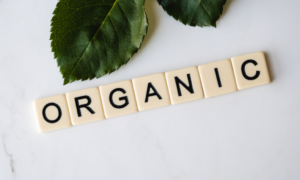Why Organic?

As a functional nutrition counselor, one of the first (and arguably, most important) conversations I have with new clients is about the benefits of eating organic. It can be uncomfortable in some cases, and I sometimes get pushback in the form of “I can’t afford to buy organic foods.” My response? “Can you afford not to?” I don’t mean for that to sound tone deaf to those who struggle financially, but the point I want to get across is that eating organic foods is an investment in your long-term health. The goal here is lowering your toxic load and balancing your hormones naturally– especially important for those who are pregnant or preparing their bodies for pregnancy. You can pay more for your food now, or you can pay more for your healthcare, or more specifically for the health consequences, later. Let me explain.
The most concerning reason to avoid conventionally grown produce is glyphosate. That is the chemical agent in the herbicide Roundup, which is widely used on crops and in yards all across the US. Glyphosate was originally developed as an antibiotic and is a known neurotoxin to pests that eat crops. It has been linked to cancers, liver and kidney damage, reproductive problems, and birth defects. There have been so many lawsuits against Monsanto, the company that developed it, that its parent company Bayer is replacing glyphosate with “alternative active ingredients” in Roundup – but not in its agricultural market products. To be clear, the use of glyphosate has become so prevalent that even some organically grown foods show traces due to soil contamination from runoff. However, the risk of exposure and toxic load are far less than in conventionally grown products.
Most, if not all, conventionally grown produce and grains are sprayed with glyphosate. In fact, some grains have even been genetically modified to contain it in their seeds so the crops don’t have to be sprayed. The two most commonly known to be affected are corn and soy. While I’m speaking about grains, I will also note that some crops, wheat and oats in particular, are often sprayed with glyphosate in order to dry them out so they can be harvested sooner – that’s a double whammy! Another fun fact about glyphosate: it disrupts our microbiome, killing off the good bacteria we need in our gut to stay healthy; AND it does the same in our soil, preventing crops from absorbing nutrients from the soil. This means that not only is the herbicide doing damage to our bodies, it can also be directly contributing to nutritional deficiencies. So when you “eat the rainbow” to provide your body with all those phytonutrients and believe you’re reaping all the benefits, guess what? If you’re buying conventional produce, the nutrients are just not there.
Moving on from produce to animal products, things get a bit more complicated. Here is what we know as fact: organic meats, poultry, dairy, and eggs are guaranteed to not have been treated with any growth hormones or antibiotics, ever. Why is that important? Because when we eat animals or their byproducts, we are eating everything they’ve eaten or been exposed to. Growth hormones will disrupt our hormones, and antibiotics will disrupt or microbiome (as well as proliferating antibiotic-resistant microbes). Most farmed animals are currently fed a “vegetarian diet.” This typically consists of corn and soy, the two most genetically-modified grains known to contain glyphosate (as mentioned above). So if you eat conventional meats and their by-products, you are eating glyphosate by proxy. Certified organic meats, dairy, and eggs fed a vegetarian diet will at least be eating organic grains. When possible, eating pastured, or grass-fed/grass-finished meats, dairy, and eggs is best. These products will be naturally higher in Omega 3s, antioxidants, and nutritional density, making for a healthier meal.
While buying conventional foods may save you some money in the short term, you can see that it might come with a higher price down the line.
To summarize:
- An organic diet is going to provide your body with more nutrients than a conventional diet due to soil quality.
- You will have less toxic exposure eating organic. You will be eating foods grown in soil that hasn’t been contaminated and animals that graze on grass/eat grains that haven’t been contaminated. Your liver will thank you!
- The delicate balance between the good and pathogenic bacteria in your gut will not be further compromised by your food choices. Since glyphosate acts as an antibiotic, ingesting it causes dysbiosis and leads to chronic gut infections and gastrointestinal issues.
- The antibiotic exposure from the glyphosate and from eating animals and their by-products potentially treated with antibiotics lead to antibiotic-resistant infections.
- Eating organic meat, dairy, and eggs means no extra growth hormones in your body to disrupt your natural hormonal balance.
All this being said, when working with those on a tight budget, I advise them to do their best. The Environmental Working Group (EWG) provides annual lists of the Dirty Dozen (https://www.ewg.org/foodnews/dirty-dozen.php) and Clean 15 (https://www.ewg.org/foodnews/clean-fifteen.php) for produce. This will help you know the worst offenders and the those that are generally considered safe. When buying meats, poultry, eggs, and dairy look for labels that say they not treated with antibiotics or hormones. And always buy wild-caught fish! (Check out these resources when looking for safe seafood: https://www.ewg.org/consumer-guides/ewgs-consumer-guide-seafood; https://www.seafoodwatch.org/).
